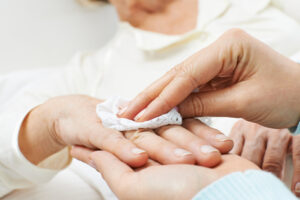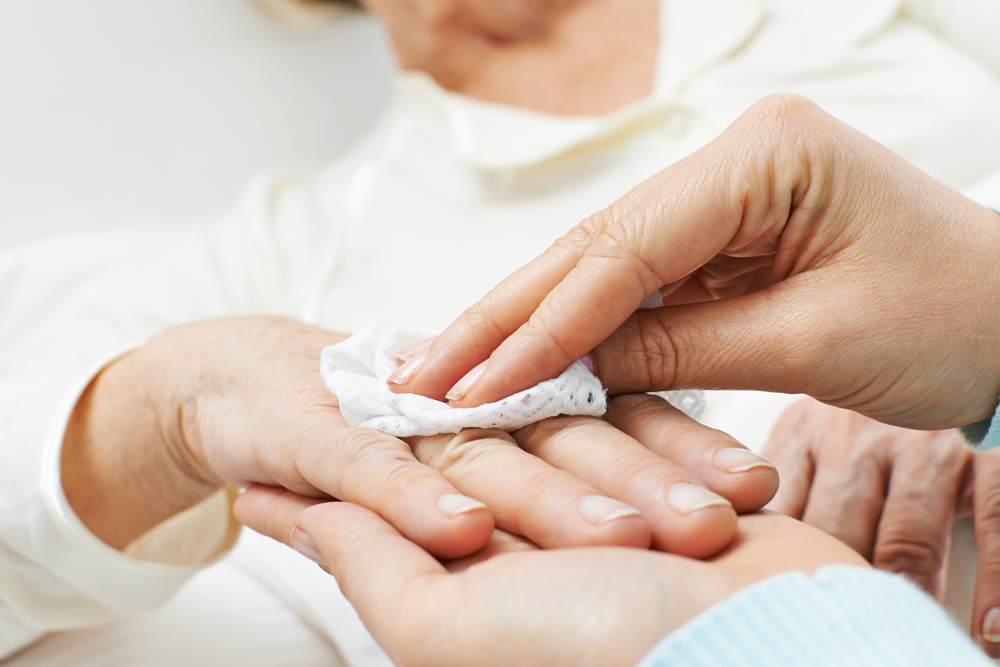Personal hygiene is essential for the health and well-being of elderly individuals, yet assisting with it can present challenges for caregivers. Beyond the physical tasks involved, providing hygiene care often touches on deeply personal and emotional areas for seniors, so it’s essential to approach these moments with sensitivity and respect.
Proper hygiene not only prevents infection and promotes comfort but also preserves the dignity and confidence of those in your care. In this guide, we’ll offer practical, actionable tips to help caregivers provide hygiene assistance while practicing discretion, maintaining respect, and promoting health.
Benefits of Personal Hygiene
Here are 8 ways proper personal hygiene benefits elderly individuals:
1. Prevents infections
Proper hygiene practices reduce the risk of bacterial, viral, and fungal infections.
2. Improves mental well-being
Cleanliness can boost the senior’s mood and morale, and foster a sense of self-worth.
3. Enhanced skin health
Regular bathing and moisturizing help prevent dry, irritated skin and bedsores.
4. Better oral health
Keeping up with oral hygiene prevents gum disease, tooth loss, and bad breath.
5. Increased comfort
Staying clean keeps seniors comfortable, particularly for individuals dealing with incontinence or mobility challenges.
6. Reduced body odor
Maintaining personal hygiene minimizes the chance of unpleasant body odors.
7. Improved social interactions
Elderly individuals who feel clean feel a heightened sense of confidence and therefore are more likely to engage in social activities.
8. Prevention of foot problems
Proper foot care can prevent issues like fungal infections, ingrown toenails, and ulcers.
Tips on Ensuring Proper Personal Hygiene Practices
When you feel confident and comfortable carrying out hygiene care with your patients, they in turn feel more secure in your care. Here are some tips to get a good set of hygiene practices under your belt.
1. Establish a Hygiene Routine for Your Patient
Set a schedule
Determine specific times of the day for hygiene tasks, like morning and evening care, to help the patient anticipate what’s coming and reduce anxiety.
Communicate clearly
Let your patient know what each task involves and ask for their preferences before beginning.
Allow for flexibility
Be open to adjusting the routine on the days your patient may not feel up for a full bath or hair wash.
Incorporate choice
Allow your patient to feel more in control by giving them patient choices, such as which soap to use or whether they want a sponge bath or shower.
2. Promote Independence Wherever Possible
The dignity of your patient or loved one is a critical aspect of personal hygiene care. Wherever possible, encourage independence to foster a sense of autonomy, even for the smallest tasks:
Lay out toiletries
Encourage your patient to brush their own teeth, comb their hair, or wash their face if they’re physically able.
Offer support, not control
If possible, instead of taking over completely, provide gentle assistance where needed, like guiding their hand when brushing teeth.
Use adaptive equipment
Consider tools like long-handled brushes, no-rinse shampoos, or electric toothbrushes for individuals with limited mobility, to enable them to take part in their care.
3. How to Assist with Different Types of Hygiene
Oral Hygiene for Seniors
Oral health is crucial in elderly care, as poor dental hygiene can lead to infections, gum disease, and difficulty eating.
- Use soft-bristled toothbrushes to prevent gum irritation.
- Assist with flossing if your patient finds it difficult, or offer floss picks as an easier option.
- Rinse with an antibacterial mouthwash after brushing to help prevent gum disease.
Hair Care
Many elderly patients may have difficulty washing and styling their hair.
- Use a gentle shampoo and avoid over-washing to prevent dry scalp.
- Consider a no-rinse shampoo for days when washing is too challenging.
- Encourage regular haircuts to maintain a neat appearance and reduce the need for complicated styling.
Nail and Foot Care
Foot care is often overlooked but is essential for preventing infections and maintaining mobility.
- Clip nails regularly to prevent them from becoming too long or causing discomfort.
- Inspect feet for sores or fungal infections, especially for diabetic patients.
- Moisturize the skin to prevent dryness and cracking, which can lead to infections.
Managing Incontinence with Care
Incontinence can be a sensitive issue, but handling it with care can help maintain comfort and dignity.
- Use gentle, unscented cleansers to clean the skin and prevent irritation.
- Apply barrier creams to protect the skin from moisture and reduce the risk of sores.
- Encourage the use of incontinence pads or undergarments that are both absorbent and comfortable, and check regularly for changes to prevent skin irritation.
Gentle Techniques for Bathing Assistance
Bathing can be a vulnerable experience for elderly individuals, but using gentle techniques can make the process easier.
- Use warm water that is comfortable but not too hot, and ensure the room is warm to prevent chills.
- Use a handheld showerhead for better control, allowing you to direct water where needed while minimizing discomfort.
- Assist with washing sensitive areas gently and with discretion to maintain your patient’s dignity.
Personal Hygiene Products We Recommend
Here are a few products that can help streamline personal hygiene care for your loved one:
- No-Rinse Shampoo Cap – A convenient solution for washing hair without the need for water, ideal for bedridden patients.
- Moisturizing Body Wash for Sensitive Skin – Keeps skin hydrated and avoids irritation.
- Electric Toothbrush with Pressure Sensor – Ensures a thorough clean while being gentle on gums, especially useful for seniors with sensitive teeth.
- Incontinence Wipes and Barrier Cream – Essential for managing incontinence, keeping the skin clean and protected from irritation.
- Long-Handled Bath Sponge – Helps individuals with limited mobility reach all areas of the body during bathing, encouraging independence.
Americare Can Help
Providing personal hygiene assistance requires more than just physical care — it requires an understanding of the individual’s emotional needs and a focus on maintaining their dignity. With the right approach, you can help your patient or loved one feel clean, comfortable, and confident.
Americare’s home health aides provide quality care, personal hygiene assistance, and other activities of daily living to hundreds of individuals throughout New York, daily.
Reach out to us at Americare for more information about how you can help your patient or loved one get all the assistance they can with discretion and dignity.

